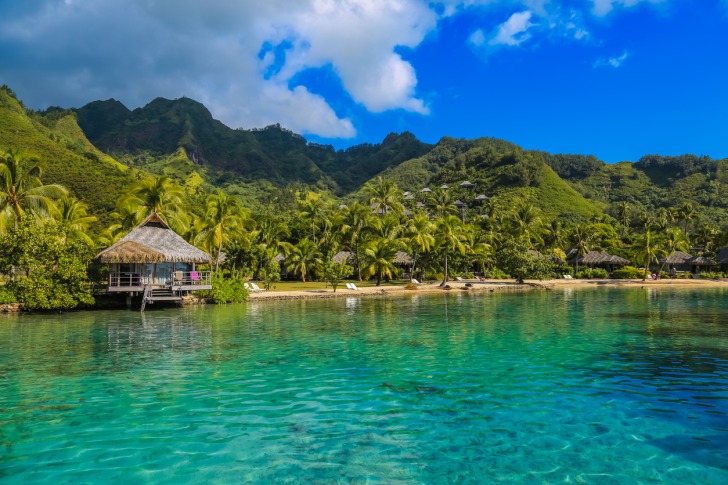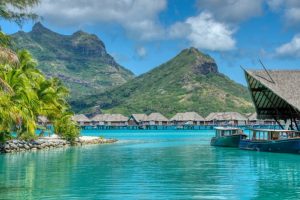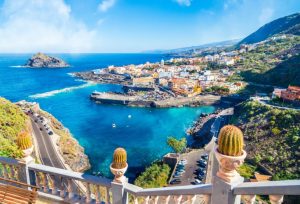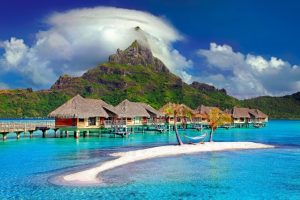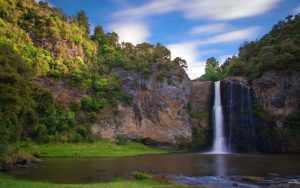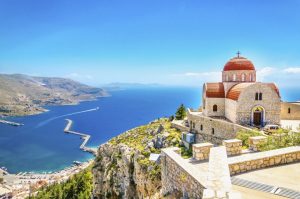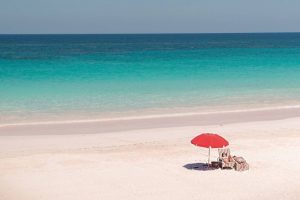Mo’orea, French Polynesia is an island paradise that is part of the Windward Islands.
The Windward Islands are a part of the Society Islands.
Mo’orea is a popular tourist destination.
The island was formed approximately two million years ago.
Changes in the population and human effects on the island have contributed to changes in the environment.
Travelers experience a glimpse into the ancient cultures and beliefs of early inhabitants, the current Polynesian culture, and modern world-class tourist adventures.
The breathtaking natural beauty, the gorgeous colors of the landscape and the pristine beaches contribute to the island being known as a paradise.
Travelers enjoy swimming, diving, snorkeling, embarking on wildlife adventures, or simply escaping the fast pace of their everyday lifestyle.
Travelers are likely to wonder about the crime rate before they start packing for Mo’orea.
Crime can ruin a trip, even a trip to paradise.
Warnings & Dangers in Mo’orea

OVERALL RISK: LOW
The overall risk for crimes against travelers is low. Some crimes or dangers do occur that travelers may witness, even if the crime is not directed toward the traveler. One danger in Mo'orea is the risk of strikes or protests. The U.S. Department of State – Bureau of Consular Affairs and the Australian Government both warn that industrial protests or strikes may become violent. Travelers should check for the latest updates related to social unrest.

TRANSPORT & TAXIS RISK: LOW
Public transportation options, including local taxis, are usually safe for travelers. The main complaint that tourists or other travelers have about taxis is the high cost, even if they only take a taxi to go a short distance. Travelers should check more than one taxi company if they want to get the best rate. Other options include getting a rental car or taking a ferry. Le Truck, which is a public transport service, provides transportation between the dock and the main villages of Mo'orea, French Polynesia.

PICKPOCKETS RISK: MEDIUM
Petty crimes are more common in Mo'orea, compared to violent crimes. Pickpockets target unsuspecting people, including tourists. It is one of the more common crimes that occur in French Polynesia. Purse snatching also occurs on the island. The U.S. Bureau of Consular Affairs warns travelers to always secure their valuables.

NATURAL DISASTERS RISK: MEDIUM
Mo'orea, French Polynesia has risks of natural disasters. The warning levels may change quickly. Travelers should stay aware of any severe weather or disaster risks. Natural disasters that may occur in Mo'orea include flooding, mudslides, and earthquakes. Tsunamis and cyclones are other natural disaster risks. The cyclone season begins in May and ends in September. The High Commission of France in French Polynesia opens a hotline in the event of an emergency. Travelers who book their trip with a tour group should check with their tour operator for instructions.

MUGGING RISK: LOW
The risk of becoming a mugging victim is a low threat for people who travel to Mo'orea. It does occur, so tourists need to minimize their risks. Examples of ways that the mugger takes advantage of unsuspecting travelers are offering to take the tourist to their destination or offering to show them a particular site. Once the mugger has the victim away from crowded areas, the traveler is an easy target. Do not show off valuables or cash.

TERRORISM RISK: LOW
Most governments that provide travel warnings rate French Polynesia as having a low risk of terrorism. The threat of terrorism may change at any time. Travelers to Mo'orea should stay alert to any sudden risks or changes to the terrorism threat level. Report any threats of terrorism to local officials.

SCAMS RISK: MEDIUM
There are several types of scams that tourists in Mo'orea need to know about to minimize their risk of becoming a victim. Do not agree to watch luggage or other belongings for anyone. A common scam is to ask a tourist to watch the scammer’s belongings. The scammer then returns with someone posing as a police officer, or an actual officer, who then demands payment or the threat of going to jail. Scammers use the “turkey drop” to target tourists. The scammer “finds” a wallet or cash on the ground and asks if it belongs to the traveler. Once the traveler touches it, another scammer appears and accuses the traveler of stealing it. They force the traveler to pay them or threaten to call the police.

WOMEN TRAVELERS RISK: LOW
Women travelers to Mo'orea, French Polynesia often have an unforgettable experience with no incidents that affect their safety. The low risk does not mean that such incidents do not occur, which is why women travelers need to take precautions. A common scam or crime in French Polynesia is drink spiking. Travelers become easy targets, which may make women more vulnerable to criminals. Do not accept drinks or food from strangers. Follow instructions if you travel with a tour group.

TAP WATER RISK: LOW
The tap water in Mo'orea is safe for travelers to drink when they visit the majestic island. Tap water may taste a little bit salty in some areas of French Polynesia. It is safe to drink unless there is a new update to the tap water safety risk.
Safest Places to Visit in Mo’orea
Mo’orea, French Polynesia, is a safe place for travelers.
Nearby islands are also usually safe for travelers.
Enjoy a vacation or an adventure of a lifetime when visiting Mo’orea.
Tourists enjoy the eight mountain ranges, and the stunning landscapes, with an abundance of fruits and vegetables.
Local shops and restaurants provide travelers with delightful cuisine and shopping experiences.
Travelers may have opportunities to see sharks, stingrays, coral, and crustaceans.
View archaeological sites on your trip to the safe island of Mo’orea.
Places to Avoid in Mo’orea
Do not worry about specific areas to avoid, since the island is safe for travelers.
Crime that occurs usually happens when people do not protect their belongings.
Avoid dark areas or areas where there are not many people, especially if you are alone.
Protect your safety by bringing a friend with you on the walk or by waiting until daylight hours.
Safety Tips for Traveling to Mo’orea
- Follow the instructions of your tour group operator. Do not venture out alone if your tour group advises against doing so.
- Check for updates with the U.S. Bureau of Consular Affairs before going on your trip. The safety of any place in the world, including Mo’orea and other islands in French Polynesia, may change at any time. Check for the latest advisories before booking your trip. Check again before leaving for Mo’orea. A level one is the normal overall risk.
- Leave valuables at home. Do not bring expensive jewelry or heirloom possessions when you travel. You may want to stand out among fellow travelers, but you do not want to stand out to criminals.
- Pack prescription medications. Pack your prescription medications in their original containers. Do not pack them only in a daily pill reminder container. You may be arrested for carrying drugs if they are not in proper prescription bottles or boxes.
- Bring the insect repellent. Protect yourself from local health risks by bringing an insect repellent. Dengue Fever and Zika are examples of risks that you take without bringing an insect repellent with you.
- Do not hike trails alone. The nature trails are beautiful and provide an opportunity to get some good exercise. They also offer the opportunity for unsuspecting travelers to become victims of muggers, pickpockets, or other criminals.
- Learn general local laws and customs. Travelers are subject to the local laws and customs. Do not commit crimes or violate customs. You may be subject to fines or jail time.
- Contact taxi companies and other public transportation companies directly. Do not accept a ride from anyone who claims to be a taxi driver without directly contacting the company, either by phone or by using the company’s app.
- Know where to find medical assistance. The hospitals in Mo’orea, French Polynesia meet international standards. Travelers who have medical emergencies or serious illnesses may be referred to medical facilities in Tahiti.
- Lock your doors and windows. Feeling a gentle island breeze may seem like an enjoyable idea. Keep the hotel windows closed and locked when you are away and at night.
So... How Safe Is Mo’orea Really?
Mo’orea, French Polynesia is a very safe place to visit for travelers who want to have a memorable trip.
Violent crimes rarely occur on the island.
Minor, petty offenses do occur.
Travelers who know the safest areas and who follow safety tips are less likely to become victims of pickpockets, purse snatchers, and muggers.
Knowing how to avoid becoming a scam victim further protects travelers.
The U.S. Government Bureau of Consular Affairs considers the islands of French Polynesia safe for travelers.
The agency rates the area as a low risk to the safety of U.S. citizens.
How Does Mo’orea Compare?
| City | Safety Index |
|---|---|
| Mo’orea | 78 |
| Tahiti | 65 |
| Bora Bora | 92 |
| La Paz (Bolivia) | 52 |
| Sao Paulo (Brazil) | 45 |
| Rio de Janeiro (Brazil) | 43 |
| Sofia (Bulgaria) | 73 |
| Siem Reap (Cambodia) | 63 |
| Phnom Penh (Cambodia) | 61 |
Useful Information

Visas
Tourist visas are not required for U.S. citizens who plan to visit Mo'orea or other islands of French Polynesia for less than 90 days.

Currency
Mo'orea, Tahiti, and other islands of French Polynesia use the French Pacific Franc currency. The exchange rate fluctuates against the U.S. dollar. Exchange money upon arriving, either at airports or banks. International hotels offer currency exchange, but it is usually at a higher exchange rate.

Weather
Experience year-round summer weather when visiting Mo'orea and other island locations in French Polynesia. Remember that there is a cyclone season, from May to September. Pack clothes for warm weather. Take sunscreen and sunglasses to better enjoy the fun in the sun.

Airports
Tahiti's Faa’a International Airport is the primary airport that travelers fly into when visiting Mo'orea. Air Tahiti provides a short, 10-minute flight to a small airport in Mo'orea, French Polynesia. Travelers may also use the small airport on Mo'orea to get a flight to visit Bora Bora, Raiatea, and some other nearby islands.

Travel Insurance
Travelers should always purchase travel insurance when they visit any destination. The fact that Mo'orea, French Polynesia, is a safe destination for weddings, honeymoons, vacations, or just getting away to paradise for a while does not negate the need for travel insurance. People sometimes think of travel insurance as a way to protect them in case they become crime victims and have valuables or cash stolen by criminals. Travel insurance protects people in a variety of situations, including when they have lost luggage, canceled flights, and medical emergencies. Purchasing travel insurance protects against many types of financial losses.
Mo’orea Weather Averages (Temperatures)
Average High/Low Temperature
| Temperature / Month | Jan | Feb | Mar | Apr | May | Jun | Jul | Aug | Sep | Oct | Nov | Dec |
|---|---|---|---|---|---|---|---|---|---|---|---|---|
| High °C | 30 | 30 | 30 | 30 | 29 | 29 | 28 | 28 | 28 | 29 | 29 | 30 |
| Low °C | 23 | 23 | 23 | 23 | 22 | 21 | 20 | 20 | 20 | 21 | 22 | 22 |
| High °F | 86 | 86 | 86 | 86 | 84 | 84 | 82 | 82 | 82 | 84 | 84 | 86 |
| Low °F | 73 | 73 | 73 | 73 | 72 | 70 | 68 | 68 | 68 | 70 | 72 | 72 |
French Polynesia - Safety by City
| City | Safety Index |
|---|---|
| Bora Bora | 92 |
| Mo’orea | 78 |
| Tahiti | 65 |
